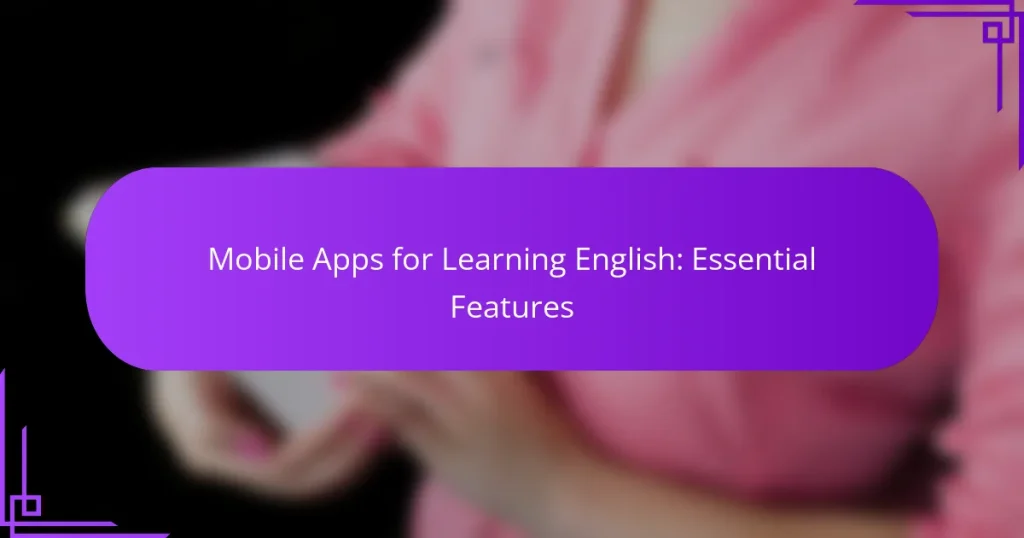Mobile apps for learning English have revolutionized language acquisition by offering interactive and personalized experiences. Essential features such as speech recognition, progress tracking, and gamification not only enhance engagement but also cater to individual learning needs. In 2023, popular apps like Duolingo and Babbel provide diverse methodologies to support various learning styles, making English learning more accessible and effective.
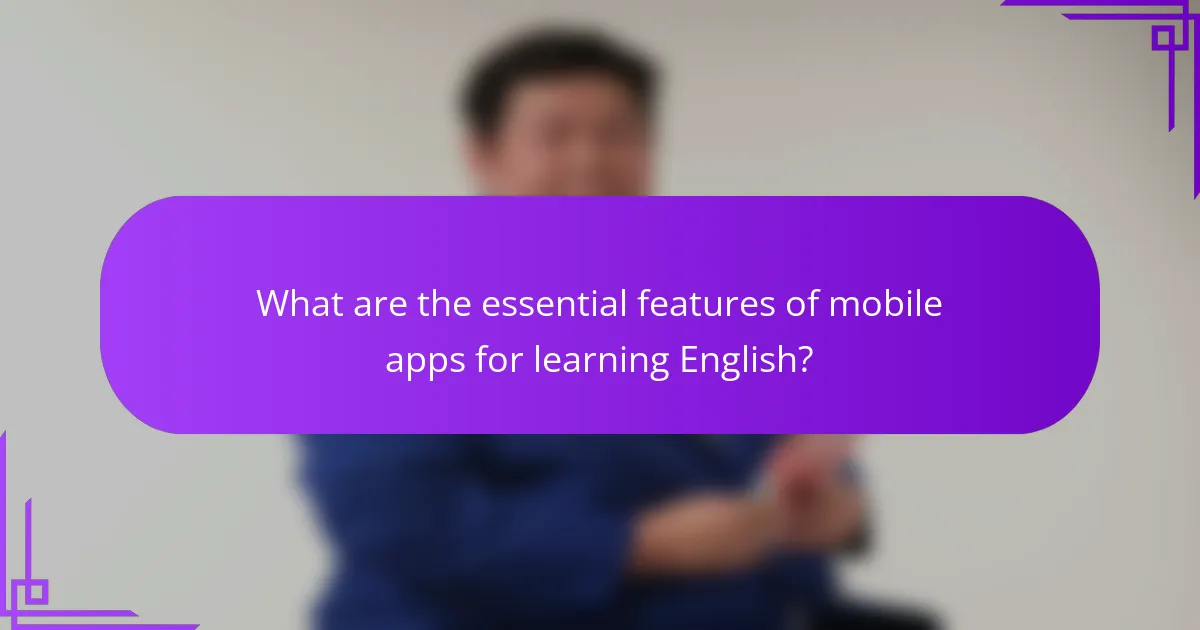
What are the essential features of mobile apps for learning English?
Essential features of mobile apps for learning English include interactive lessons, speech recognition technology, progress tracking, gamification elements, and personalized learning paths. These features enhance engagement, facilitate effective learning, and cater to individual user needs.
Interactive lessons
Interactive lessons are crucial for keeping learners engaged and motivated. They often include quizzes, fill-in-the-blank exercises, and multimedia content that encourage active participation. Look for apps that offer a variety of formats to cater to different learning styles.
For example, some apps may incorporate video lessons with interactive questions, while others might use voice prompts to guide users through exercises. This variety helps reinforce concepts and improves retention.
Speech recognition technology
Speech recognition technology allows learners to practice their pronunciation and speaking skills in real-time. This feature analyzes the user’s speech and provides instant feedback on accuracy and fluency. It is particularly beneficial for those aiming to improve their conversational skills.
When choosing an app, ensure it has robust speech recognition capabilities that can handle various accents and dialects. This will provide a more realistic learning experience and help users gain confidence in their speaking abilities.
Progress tracking
Progress tracking features help users monitor their learning journey and identify areas that need improvement. Apps typically offer dashboards that display completed lessons, quiz scores, and time spent on different topics. This information is valuable for setting goals and staying motivated.
Look for apps that allow users to set personal milestones and receive reminders to practice regularly. Regular updates on progress can significantly enhance commitment and accountability in the learning process.
Gamification elements
Gamification elements, such as points, badges, and leaderboards, make learning more enjoyable and competitive. These features encourage users to engage with the app consistently by rewarding them for completing tasks and achieving goals.
Choose apps that integrate gamification in a balanced way, ensuring it enhances rather than distracts from the learning experience. For instance, daily challenges or streaks can motivate users to practice regularly while reinforcing their skills.
Personalized learning paths
Personalized learning paths tailor the educational experience to individual users based on their proficiency levels and learning goals. This feature adapts content and difficulty based on user performance, ensuring that learners are neither overwhelmed nor bored.
When selecting an app, check if it offers customization options that allow users to focus on specific skills, such as vocabulary, grammar, or conversation. Personalization can lead to more effective learning outcomes and a greater sense of ownership over the learning process.
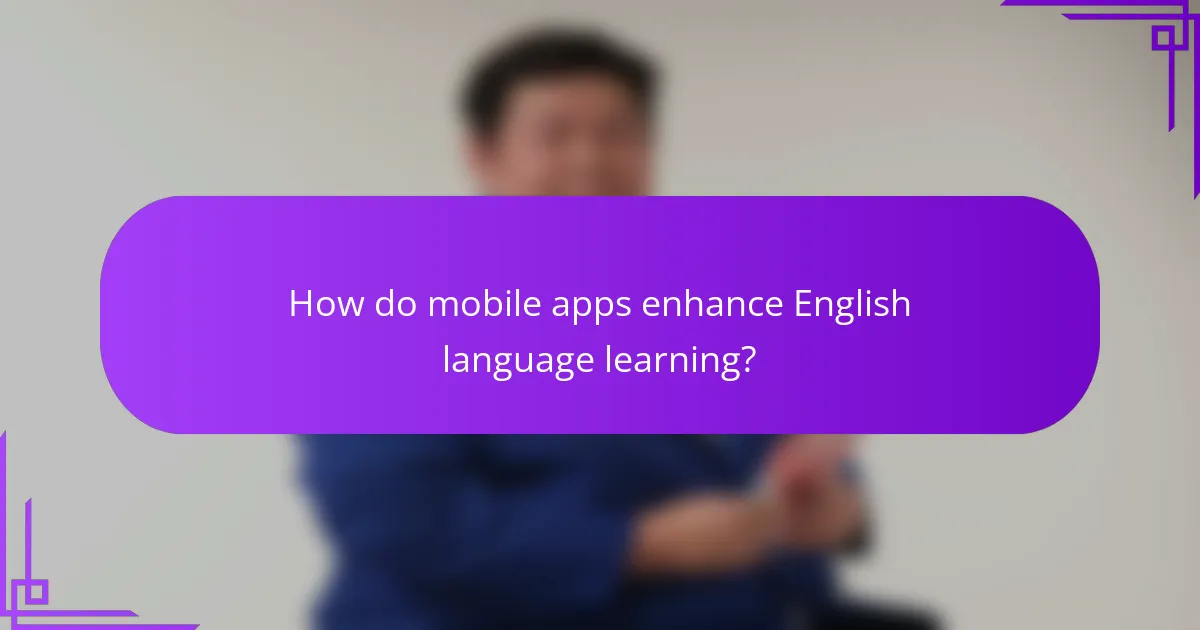
How do mobile apps enhance English language learning?
Mobile apps significantly enhance English language learning by providing flexible, interactive, and personalized experiences. They leverage technology to create engaging environments that cater to various learning styles and schedules.
Accessibility and convenience
Mobile apps offer unparalleled accessibility, allowing learners to study anytime and anywhere. This convenience means users can practice English during commutes, breaks, or while waiting, making it easier to fit learning into busy lifestyles.
Many apps are designed for offline use, enabling learners to download lessons and practice without needing a constant internet connection. This feature is particularly beneficial for users in areas with limited connectivity.
Real-time feedback
Real-time feedback is a crucial feature of many language learning apps, helping users identify and correct mistakes immediately. This instant response can enhance retention and understanding, as learners receive guidance on pronunciation, grammar, and vocabulary usage.
Some apps utilize speech recognition technology to evaluate pronunciation, offering suggestions for improvement. This interactive approach fosters a more engaging learning experience and encourages users to practice more frequently.
Engagement through multimedia
Multimedia elements such as videos, audio clips, and interactive exercises make learning more engaging and effective. These features cater to different learning preferences, helping users absorb information through visual and auditory means.
Many apps incorporate gamification techniques, such as rewards and challenges, to motivate learners. This approach not only makes studying more enjoyable but also encourages consistent practice, which is essential for language acquisition.
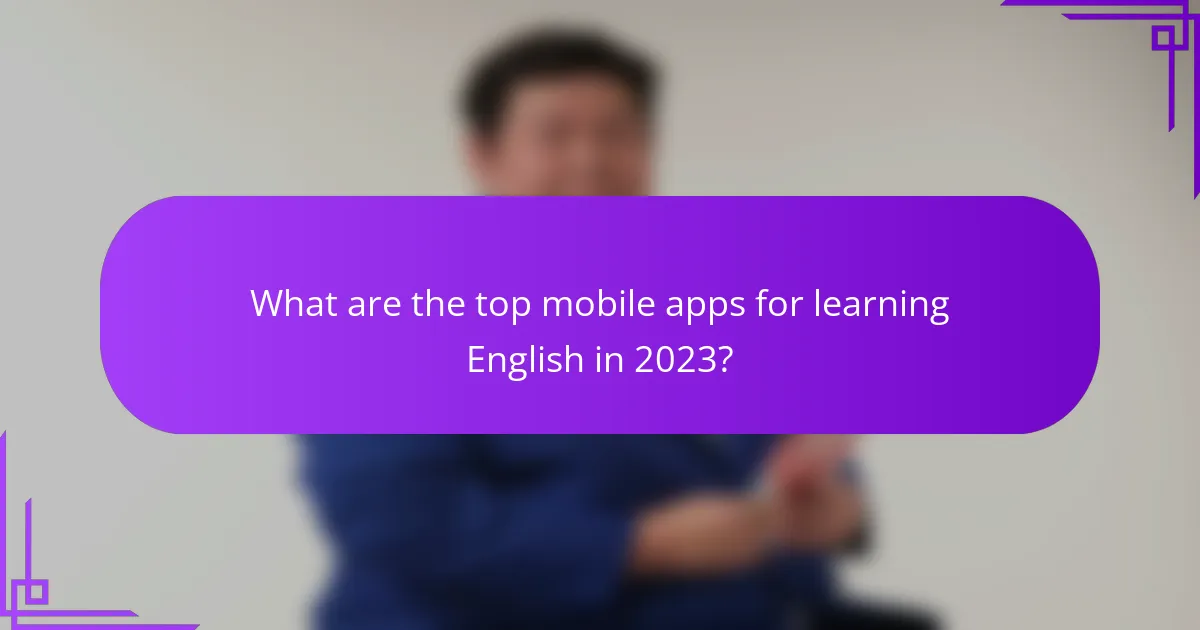
What are the top mobile apps for learning English in 2023?
In 2023, popular mobile apps for learning English include Duolingo, Babbel, Rosetta Stone, and Busuu. Each app offers unique features and methodologies to enhance language acquisition, catering to various learning styles and preferences.
Duolingo
Duolingo is a gamified language learning app that makes studying English engaging and fun. Users progress through levels by completing exercises that cover vocabulary, grammar, and pronunciation.
The app’s bite-sized lessons typically take about 5-10 minutes, making it easy to fit into a busy schedule. Duolingo also includes a social component, allowing users to compete with friends and track their progress.
Babbel
Babbel focuses on conversational skills and practical vocabulary, making it ideal for learners who want to use English in real-life situations. The app offers structured courses tailored to different proficiency levels.
Lessons are designed to take around 10-15 minutes and include speech recognition technology to improve pronunciation. Babbel’s subscription model provides access to all courses, which can be a cost-effective choice for serious learners.
Rosetta Stone
Rosetta Stone employs an immersive approach, teaching English through context rather than translation. This method encourages learners to think in English, which can enhance fluency over time.
The app offers a range of interactive activities, including speech recognition and live tutoring sessions. While it may require a larger time commitment, many users find the immersive experience beneficial for long-term retention.
Busuu
Busuu combines self-paced learning with community interaction, allowing users to practice their English with native speakers. The app offers personalized study plans based on individual goals and proficiency levels.
With lessons lasting around 10-15 minutes, users can easily integrate learning into their daily routines. Busuu also provides feedback from native speakers, which can significantly improve language skills through real-world practice.
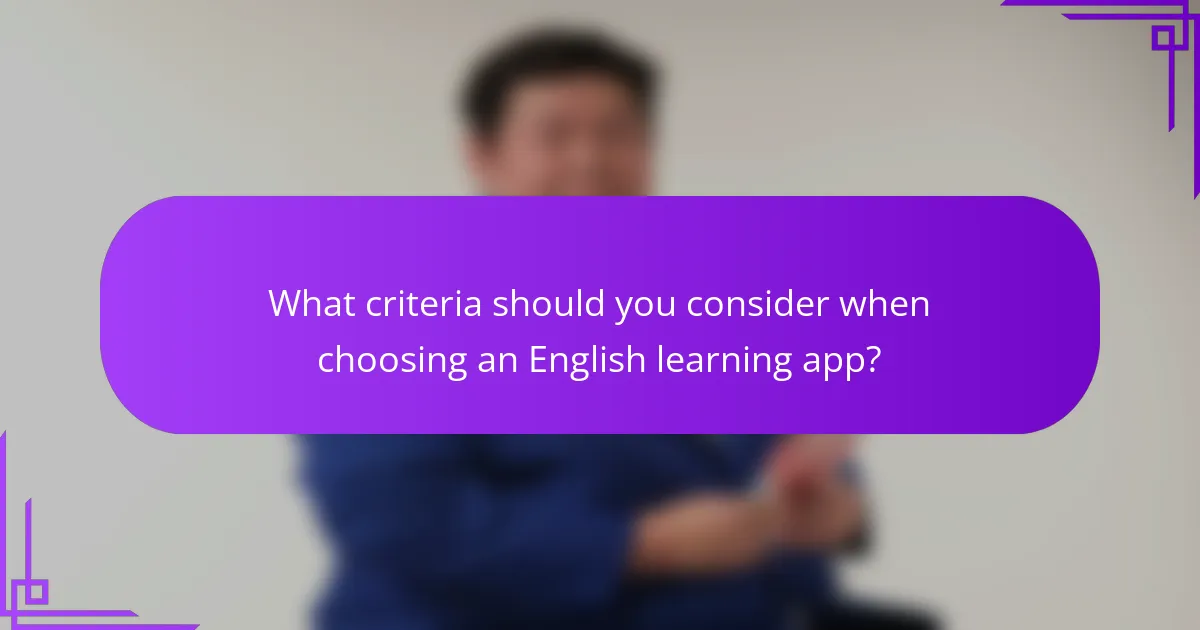
What criteria should you consider when choosing an English learning app?
When selecting an English learning app, consider user reviews, content quality, and cost structures. These factors will help you find an app that suits your learning style and budget.
User reviews and ratings
User reviews and ratings provide insight into the app’s effectiveness and user satisfaction. Look for apps with high ratings and positive feedback, as these often indicate a reliable learning experience.
Check platforms like the App Store or Google Play for detailed reviews. Pay attention to comments about the app’s usability, engagement level, and customer support.
Content quality and variety
The quality and variety of content are crucial for maintaining interest and facilitating effective learning. Choose apps that offer diverse materials, such as videos, quizzes, and interactive exercises.
Look for apps that cover different aspects of language learning, including vocabulary, grammar, speaking, and listening. A well-rounded app will cater to various skill levels and learning preferences.
Cost and subscription models
Understanding the cost and subscription models is essential to avoid unexpected expenses. Many apps offer free trials, allowing you to evaluate their features before committing.
Compare subscription options, such as monthly versus annual plans, to find what fits your budget. Some apps may provide a one-time purchase option, which can be more economical in the long run.
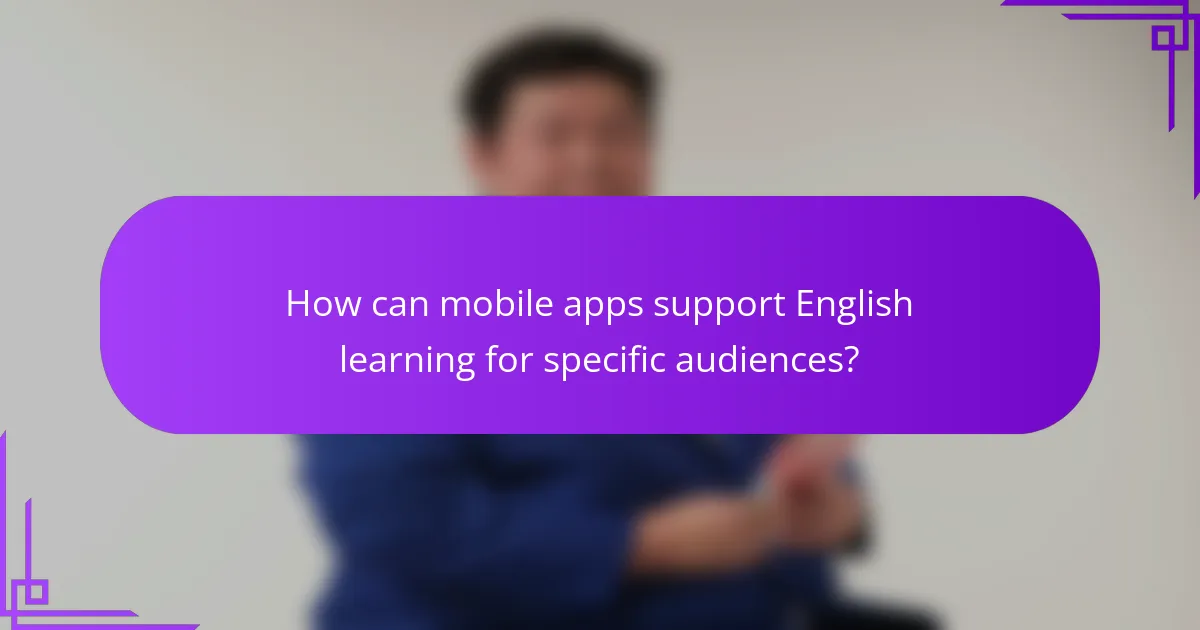
How can mobile apps support English learning for specific audiences?
Mobile apps can effectively support English learning by tailoring content and features to meet the unique needs of different audiences. By focusing on specific contexts, such as children, business professionals, and travelers, these apps enhance engagement and facilitate practical language acquisition.
Apps for children
Apps designed for children often incorporate gamification, colorful visuals, and interactive elements to make learning fun and engaging. Features such as storytelling, songs, and quizzes help reinforce vocabulary and grammar in an enjoyable way.
When selecting an app for children, look for those that offer age-appropriate content and adaptive learning paths. Apps like Duolingo Kids or ABCmouse provide structured lessons that progress with the child’s skill level, ensuring a personalized learning experience.
Apps for business professionals
Business professionals benefit from apps that focus on industry-specific vocabulary, formal communication skills, and cultural nuances. These apps often include modules on writing emails, conducting meetings, and presenting ideas effectively in English.
Consider apps like LinkedIn Learning or Babbel for Business, which provide tailored courses and real-world scenarios. Look for features that allow users to practice speaking and receive feedback, as this can significantly enhance fluency and confidence in professional settings.
Apps for travelers
Travel-focused apps emphasize practical language skills, such as common phrases, pronunciation, and essential vocabulary for navigating new environments. These apps often include audio guides and interactive maps to help users communicate effectively while traveling.
Apps like Google Translate or Rosetta Stone Travel offer quick access to key phrases and translations. When choosing an app, prioritize those that provide offline access, as this can be crucial in areas with limited internet connectivity.
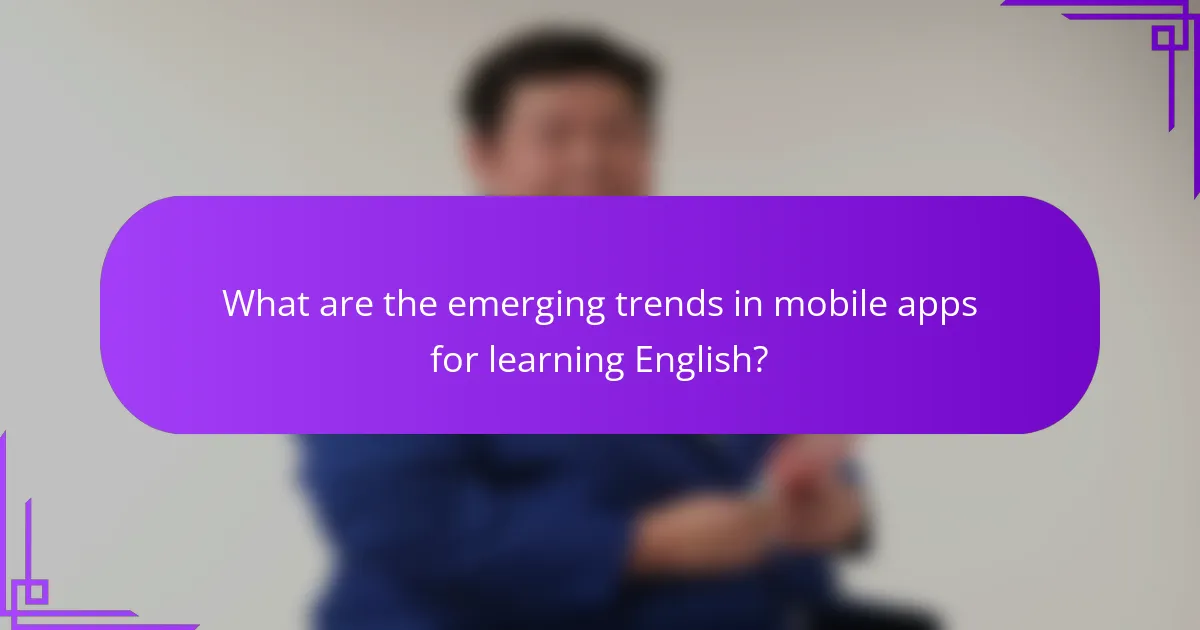
What are the emerging trends in mobile apps for learning English?
Emerging trends in mobile apps for learning English focus on personalized learning experiences, gamification, and the integration of artificial intelligence. These trends enhance user engagement and improve language acquisition through tailored content and interactive features.
Personalized Learning Experiences
Personalized learning experiences in English learning apps adapt to individual user needs, preferences, and proficiency levels. By utilizing algorithms, these apps can assess a learner’s strengths and weaknesses, providing customized lessons that target specific areas for improvement.
For instance, apps may offer different pathways based on user performance, allowing learners to progress at their own pace. This approach not only boosts motivation but also helps in retaining information more effectively.
Gamification
Gamification incorporates game-like elements into English learning apps to make the process more enjoyable and engaging. Features such as points, badges, and leaderboards encourage users to complete lessons and practice regularly.
For example, an app might reward users with points for daily practice or completing challenges, fostering a sense of achievement. This trend is particularly effective for younger learners who may respond better to interactive and playful learning environments.
Integration of Artificial Intelligence
Artificial intelligence (AI) is increasingly being integrated into English learning apps to enhance user interaction and provide real-time feedback. AI-powered chatbots can simulate conversations, allowing learners to practice speaking and listening skills in a low-pressure setting.
Additionally, AI can analyze user responses to offer personalized suggestions for improvement, making the learning experience more efficient. This technology helps learners identify pronunciation errors or grammatical mistakes instantly, promoting quicker mastery of the language.
